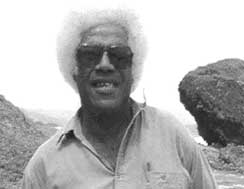|
|
 |
| |
The rough ride we gave our Caribbean arrivals
Today’s black youngsters should learn from the Caribbean literature that blossomed in the 1950s, argues Angela Cobbinah
The Pleasure of Exile by George Lamming, Pluto Press, £15.99 order this book
Many years ago as a young black woman in search of herself, there was a section of a book that I would read over and over again, each time marvelling at its meaning.
The Emigrants by Caribbean writer George Lamming was the first novel I read that spoke to me of what would later be called the black British experience.
The story was about a group arriving from the Caribbean in 1950s England. One chapter describes how one of the arrivals, Collis, fares when invited to dinner by a British Council official, Pearson. The evening begins hopefully enough for Collis, who believes Pearson has offered him the hand of friendship. But Pearson’s courteousness vanishes the minute he receives a telephone call about one of his Caribbean charges, who has been picked up by the police.
He proceeds to challenge Collis about why so many of his people are flocking to England causing trouble. Lamming uses the encounter to symbolise the negative relationship between the coloniser and colonised, how Pearson is unable to see beyond his guest’s colour and how this strips him of his identity.
Yet for all his silent rage, Collis must assume what Lamming elsewhere describes as the “camouflage of self evaporation”.
This acute sense of alienation was to strike such a chord with me and is a major thread running through Lamming’s fiction and inspired his republished collection of essays, The Pleasures of Exile. It also preocuppied Lamming’s fellow Caribbean writers gathered with him in the drabness of post-war London, where cold stares and enigmatic sneers formed a welcoming party. They had all emerged from a cultural revolution in Trinidad that would throw up an extraordinary array of talent, producing some 50 novels between 1948 and 1958 and two future nobel lauraeates,VS
Naipaul and Derek Walcott.
Lamming, a poet who had his work broadcast on the BBC’s Colonial Service, travelled to England in 1950 aged 23, accompanied by Sam Selvon, author of the classic The Lonely Londoners.
After finding work with the BBC’s Caribbean Voices programme, he soon found himself rubbing shoulders with the London literati.
“One day after giving a reading attended by [TS] Eliot, he was asked if he had written a novel,” says the Islington-based writer John La Rose, a fellow member of the Trinidad literary set. Lamming had not, but decided to try his hand at one.
The result was In the Castle of My Skin in 1953, a semi-autobiographical account of growing up in Barbados and, according to La Rose, who went on to found New Beacon Books in Stroud Green Road, his finest work.
Lamming wrote a further two novels before publishing The Pleasures of Exile in 1960. In this absorbing mix of reflection, historical account and personal anecdote, Lamming uses Caliban, Prospero’s slave in Shakespeare’s Tempest, as a connecting theme to illustrate the cultural and spiritual bondage he must free himself from.
“I am a direct descendant of slaves, too near to the actual enterprise to believe that its echoes are over with the reign of emancipation,” he writes.
The paradox for the Caribbean writer in particular is that, exiled from his nature and colonised by Prospero’s language, he must go to England to win the “approval of headquarters”, a voluntary exile to a place which seeks “to cut down in size all of non- England”, starting first with the colonial.
Although it frequently springs to mind on reading the book, Lamming never uses the word racism, even in allusions to the 1958 Notting Hill race riots, which cast a shadow over those who “suffer a defect of colour”.
But racism does not reflect the totality of what Lamming is writing about.
His lyrical journey of self-discovery has to be understood in the context of a pivotal moment in history.
Most of Africa had gained its “freedom”, as Lamming declares in awe, and the Caribbean stood on the threshold of independence.
There could be no more fertile soil for personal growth.
“It was a time of great excitement and new possibilities not only in terms of independence but plans for a West Indian Federation as well,” says La Rose.
He adds that Lamming himself was a progressive figure in Caribbean literature and politics and this informed all his work.
So what relevance does a book rooted in a time unrecognisable to anyone under the age of 40 have for today?
Lamming, based in Barbados and a visiting lecturer to the US, is now not widely among black youngsters, partly because he wrote his last novel in 1979, and partly, says La Rose: “Because young people don’t read; they’re into music and TV. Reading was our tradition.”
But as new rules of engagement are drawn up for the Collis’s grandchildren in the mixed-up debate on multiculturalism and asylum, this book offers a new perspective informing us that Prospero has gained a second wind and that we must not be as forgetful of history as he was.
|
|
|
|
 |
|


